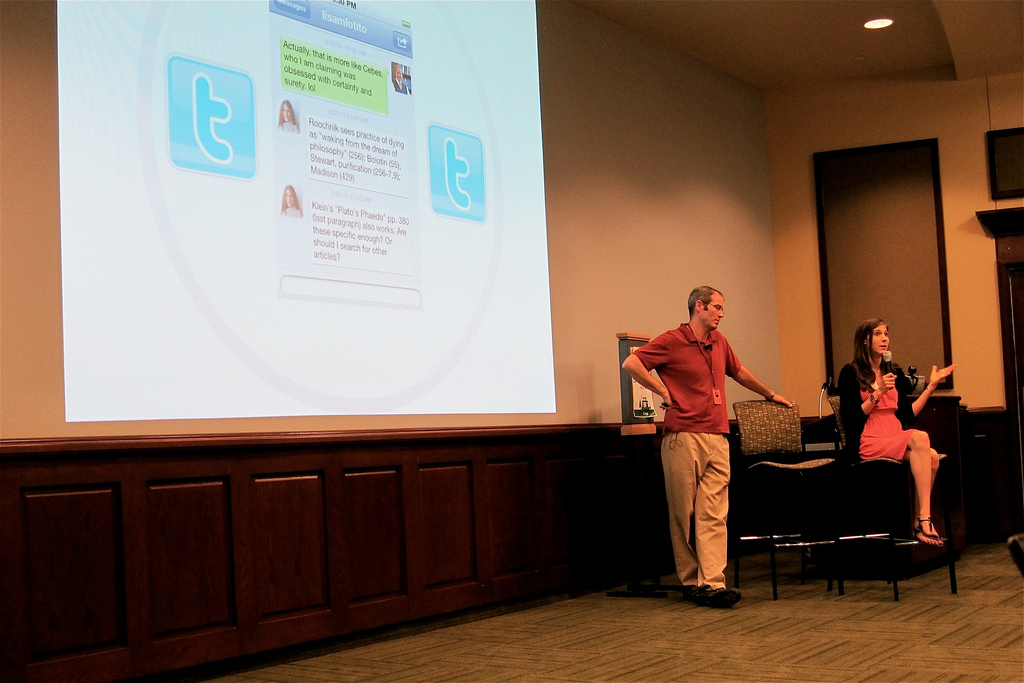Today in the Foster Auditorium of the Pattee/Paterno Library, my undergraduate research assistant, Lisa Lotito, and I gave a presentation about the workflow we use in doing philosophical research.
I have written in some detail about my basic research cycle, but this presentation allowed us to articulate more fully how we use the collaborative power of digital media to do scholarly research in philosophy.
The process begins with a discussion about my current book project on Socratic and Platonic politics. Once Lisa had a sense of the project, we were able to delineate a basic set of sources on Plato’s Phaedo for a chapter on that dialogue I was also going to present at the 2011 Hermeneutisches Kolloquium in Freiburg.
The presentation, the recording for which I embed below, articulated how we created a shared collection on Mendeley to manage pdf resources, how Lisa added notes to Mendeley summarizing some of the main points of those articles and how they related to my thesis. We discuss how I use Dropbox to collect all the documents and Evernote and GoodReader to annotate the pdf files.
We used direct messaging in Twitter to communicate in a dynamic and asynchronous way that allowed me to request more resources or ask Lisa to look for specific issues in the secondary literature. This was particularly helpful during the two week period when I returned to the primary text to develop the details of my interpretation. I was able to rely on Lisa to help me recall the terms of the debate in the secondary literature on an issue or theme in the dialogue.
I used Word and Scrivener to write the chapter and, because of the ongoing limitations of Mendeley with citations, we returned to Zotero to add citations. Obviously, the constellation of technological tools we used to do this research is varied and perhaps complex; but what stands out, it seems to me, is the way Lisa and I were able to work in a collaborative way to do serious philosophical research. The asynchronous nature of our communication and the digital medium of many of the texts to which we referred allowed us to work in a collaborative way even when we were often at opposite ends of the Commonwealth.
My hope is that this might serve as one model for collaborative research in the humanities; for we have not historically cultivated the models of scholarly apprenticeship in the humanities that the sciences and social sciences have when they undertake research with students in their labs and research groups.
The Research Circle from Christopher Long on Vimeo.


I wish I had known about the presentation! I would love to have been there. Lisa is a great student, I am glad she has worked out as an assistant.
Chris, how much background knowledge of Plato/Socrates did your asst need in this process, would more have been better, and how much of you working these fragments/aspects through into something coherent could you share with her?
Dirk, Lisa has a strong undergraduate background in philosophy. She is an honors student and a History major. She worked to familiarize herself with the dialogues on which I am focused, but she does not know ancient Greek. Still, she became an expert on the literature in English on the subject and she prepared some PDF files in French and German for me.
Most important, she is a very thoughtful, imaginative, curious and diligent student with an assiduous work ethic. Her insights into the dialogue, particularly the dramatic elements, the relational dynamics between the characters, and the important philosophical issues at stake are excellent.
certainly didn’t mean to impugn this individual in any way, was trying to get a sense in general of what it takes for a non-expert to take part in such a project and how much of the work process, on your end, was available to her as a student, since this process is often not part of the undergrad, or even really often the grad, student experience.
I did not take your comment to impugn Lisa in any way, and I hope my response did not suggest that I did. Actually, I really appreciated the question, because it gave me the opportunity to talk about some of the ways that Lisa is an exceptional student.
But even so, I think there are many excellent undergraduate (and graduate) students who can and do collaborate with faculty in the way we have. I continue to find that if we give students the opportunity to be real partners in the scholarly process, they thrive and enrich our scholarship.
very good, I know that many folks are focused on the disparity in power between students and those who grade them but for me true gap/tension is between the levels of experience/knowledge, somewhere in his 3rd decade of teaching my father struggled not just with finding common examples/illustrations to share but with a lack readily available concepts that didn’t cover the fuller reality/understanding of things, did justice to their complexity and so opened inquiry not settling it in the minds of students.My quasi solution to this dilemma is to focus on teaching students process more than answers if this makes some rough sense and this kind of apprenticeship seems much more promising than lectures.
http://www.marshallmcluhanspeaks.com/understanding-me/1974-transformation-theory-of-communication.php
Chris, this mutual trust in the dialogic method of writing is creative and dynamic. I have heard others in the social sciences pine for ways to accomplish this in their writing and it has seemed frightening and competitive. Thanks for sharing this way of being in the dynamic, scholarly pursuit of your writing and teaching.